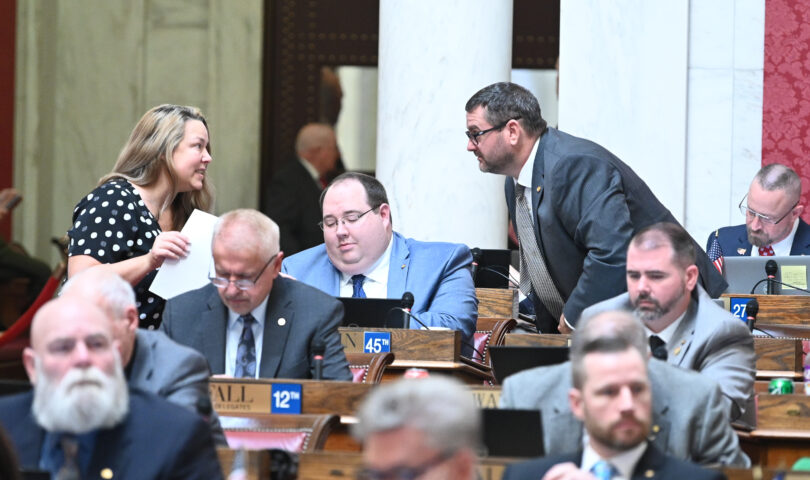MORGANTOWN — Monday was the 13th day of the legislative session and the House and Senate were both getting busier moving bills during their floor sessions. The House dealt with drug, booze and voting bills, while the Senate passed on dealing with school closures and consolidations.
The House
HB 2184 passed 94-2 and goes to the Senate. It imposes stricter penalties on someone who illegally possesses fentanyl and exposes a governmental representative — including police and EMS responders — to the fentanyl.
Delegates Barbara Evans Fleischauer, D-Monongalia, and Mike Pushkin, D-Kanawha, voted against it. Fleischauer said that while fentanyl is a serious problem, so is overcrowded prisons. Pushkin said it won’t work as a deterrent and does nothing to solve the drug-abuse problem.
Delegate Jonathan Pinson, R-Mason, said that many laws in the books don’t necessarily stop people who intend on breaking them, but this bill offers just consequences. “If they hurt these people, I say they need charged with this code.”
HB 2972 deals with home liquor distilling. It allows a single-person household to make up to 50 gallons per year for personal use, and a household of two or more to make 100 gallons per year.
Judiciary chair Moore Capito, R-Kanawha, said home production of wine and beer are already permitted; this just adds spirits to the list.
It passed last year, 78-19, and died in the Senate. It passed 74-22 on Monday and returns to the Senate. Locally, Republicans Buck Jennings, Phil Mallow and Guy Ward voted against it; all other local delegates voted for it. Delegate John Williams, D-Monongalia, was absent for the day,
HB 3303 forbids a political party from filling a ballot vacancy after a primary election if the vacancy was caused by failure of a candidate to file, or if a candidate withdrew.
Pushkin and Fleischauer expressed concern that the language was unclear and could prevent a third party that operates by convention and doesn’t hold a primary from putting a candidate up for the general election. Capito said that while it isn’t expressly stated, it applies only to parties that hold primaries.
It passed 83-13. Fleischauer and Delegates Evan Hansen and Danielle Walker, both D-Monongalia, voted against it.
The Senate
SB 229 requires an impact statement before a school board closes or consolidates a school or schools, except where the voters have already passed a construction bond affecting those schools.
The impact statement must address the student affected, including transportation times; the financial health of the county; the enrollment of the school that would receive students through consolidation; the school personnel affected; and the community.
It passed 29-0 and goes to the House.
During closing remarks, Sen. Mike Woelfel, D-Cabell, called attention to a House bill introduced on Monday.
HB 4015 creates the West Virginia Religious Freedom Restoration Act, “to ensure that, in all cases where state action is alleged to substantially burden the exercise of religion, a compelling interest test is mandated, and, strict scrutiny is applied.”
Woelfel said this bill is an attempt to resurrect the 2016 RFRA bill that failed 7-26 in the Senate. It aims to permit discrimination based on sexual orientation.
Woelfel said that after Indiana passed a RFRA bill, it lost 60 conventions, including the NCAA basketball tournament.
Nucor plans to build a steel mill in Mason County, he said, and “Companies like Nucor do not favor discrimination.”
Woelfel referred to a billboard he saw while driving through Greenbrier County. “No hate in my holler,” it said. Woelfel closed, “Hopefully we won’t have to wrestle with that issue in this body.”
TWEET David Beard @dbeardtdp
EMAIL dbeard@dominionpost.com




